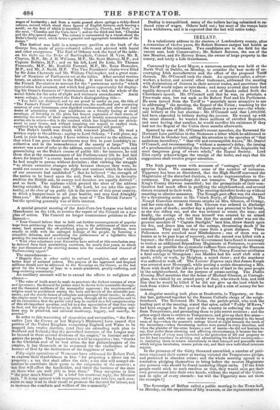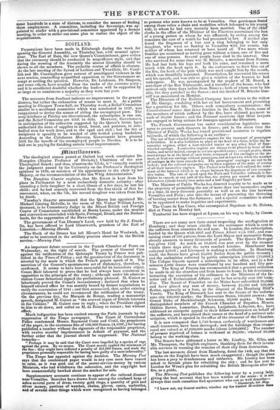IRELAND.
In a valedictory address to the electors of Londonderry county, after a connexion of twelve years, Sir Robert Bateson assigns bad health as the reason of his retirement. Two candidates are in the field for the vacant seat, both Conservative; Mr. Robert Bateson, the son of the late Member, and Sir Hervey Bruce, the owner of large property in the county, and lately a Life Guardsman.
Convened by the Lord Mayor, a numerous meeting was held at the North Wall in Dublin, on Monday, to consider the best mode of en- couraging Irish manufactures and the effect of the proposed Tariff thereon. Mr. O'Connell took the chair. An operative cutler, a silver- worker, a hatter, and several other tradesmen, addressed the meeting with declarations of distress in their several trades, and assertions that the Tariff would injure or ruin them; and many averred that trade had rapidly decayed since the Union. A vote of thanks called forth the Chairman's speech. Mr. O'Connell said that he was, on principle, a Free-trade man, but not such as Sir Robert Peel and his Parliament. He soon turned from the Tariff to " materials more attractive to use in addressing " the meeting, the Repeal of the Union ; touching by the way on England's difficulties. Of those there is a new one—the whole- sale bribery at the last election : Mr. O'Connell said that 1,500,0001. had been expended in bribery during the contest. He wound up with the usual demand : he wanted three millions of enrolled Repealers, and once having that number, he would sacrifice his existence if they had not the Repeal of the Union three months afterwards.
Spurred by one of Mr. O'Connell's recent speeches, the Reverend Sir Harcourt Lees publishes in the Statesman a letter which he addressed to Lord Eliot in October last, calling his attention to the speeches of "that audacious incendiary," " that vile and contemptible knave," Mr. Daniel O'Connell, and recommending "without a moment's delay, the issuing of a proclamation prohibiting the future meetings of this despicable but most dangerous gang of sworn rebels," the Repeal Society. Lord Eliot curtly acknowledges the receipt of the letter, and says that his suggestions shall receive proper attention.
The Irish papers teem with accounts of "outrages," mostly of an agrarian kind. We enumerate some of the number of instances. Tipperary has been so disordered, that the High Sheriff convened the Magistrates of the disturbed districts, to make representations to Go- vernment. The proceedings did not transpire. The Magistrates of King's County likewise assembled ; but the promptitude of their com- bination had much effect in pacifying the neighbourhood, and several rioters returned to their work. The meeting therefore broke up without resorting to ulterior measures. The Nenagh post-office was the channel for a threatening notice to Mr. Uniack Bayly, of Ballinaclough. The Nenagh Guardian recounts riotous attacks on Mrs. Gleeson, of Grange, and her care-taker. At first Mrs. Gleeson was ordered to discharge him on pain of death ; another day a pistol was presented to her breast, as she was riding out, and she was ordered to retain the man ; and finally, the cottage of the man himself was entered by an armed and disguised party, who told him that the second order was not the genuine mandate of " Captain Starlight," beat him, threw thatch upon his fire, and drove him out of the cottage, threatening death if he returned. They said that they came from a great distance. Three Policemen were attacked near Mitchelstown ; one of them was so beaten as to be past hope of recovery, and the second was killed with a bayonet ; the third escaped. The Government have found it necessary to station an additional Stipendiary Magistrate at Portumna, to prevent as much as possible the systematic ruffians from crossing the Shannon from the adjoining border of Tipperary. The Newry Examiner attributes a fatal outrage to Orangeism : one Madden had his scull cleft with a spade, while at work, by Meighan, a noted rioter ; and the murderer was suffered to walk off. The Leinster Express says that James Keogh was arrested near Moneygall, while posting a notice threatening a Mrs. Ryan with death if she did not give ten acres of land to the poor people in the neighbourhood, for the purpose of potato-setting. The Dublin Evening Mail mentions that the house of Michael Gleeson, at Curragb- glass, was visited by an armed party of four, who struck him, and told him that he would be killed if he did not give up the land which he took from widow Maher ; to whom he had paid a sum of money for her interest.
A singular meeting took place at Dunkerrin, in Tipperary, on Sun- day last, gathered together by the Roman Catholic clergy of the neigh- bourhood. The Reverend Mr. Nolan, the parish-priest, who took the leading part at the meeting, stated that spies, called Paddy M'Kews," had been engaged in that part of the country in seducing the people from Temperance, and persuading them to join secret societies ; and the priest urged them to return to Temperance, and give up their fire-arms-
Now, he said, when crime and murder were being.perpetrated in the broad noon of day—when the peasant's cottage blazed at night beneath the torch of the incendiary—when threatening notices were posted in every direction, and when the plunder of fire-arms became a sort of mania—he did not hesitate to say, that under these alarming and afflicting circumstances, it became the im- perative duty cf every man interested in the protection of life and property to use his best exertions in advising and admonishing his deluded countrymen— in imploring them to return immediately to that tranquil and peaceable'state which religion inculcates, reason points out, and their own individual interests require. In the presence of the thirty thousand assembled, a number of peni- tents expressed their sorrow at having violated the Temperance pledge, and promised to abandon crime; and the whole meeting agreed to a resolution pledging themselves to bring before the nearest Magistrate any persons who should be found tendering illegal oaths. [If the Irish people could stick to such resolves as that, they would soon get their own government into their own hands, without the repeal of the Union, and in spite of every obstacle : but will the Tipperary men set them
the example f] .
The Sovereign of Belfast called a public meeting, in the Town-hall, on Monday, on the requisition of fifty weavers, as the representatives of
some hundreds in a state of distress, to consider the means of finding them employment. A committee, including the Sovereign, was ap- pointed to confer with a provisional committee appointed by a former meeting, in order to strike out some plan to realize the object of the requisitionists.



























 Previous page
Previous page